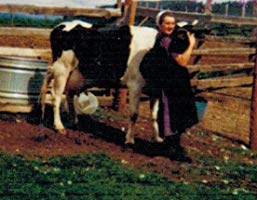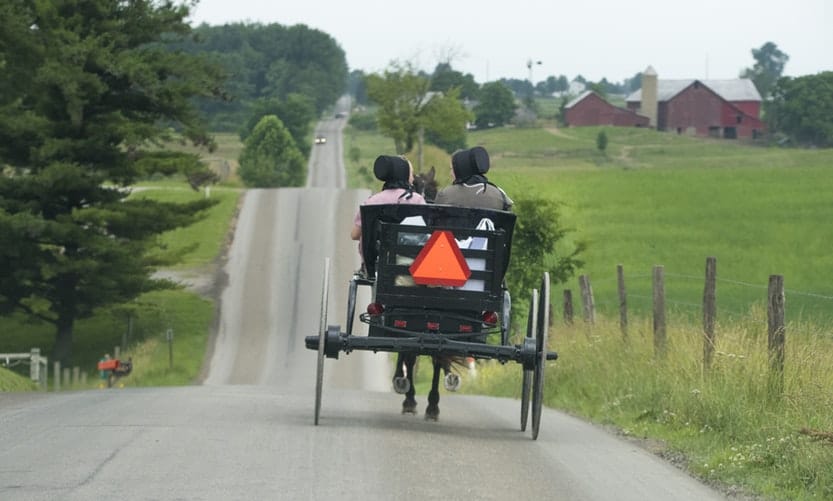(trigger warning: sexual abuse)
We tend to view the Amish with smiling condescension: what a quaint, wholesome way of life, free from modern-day problems. But the reality isn’t so neat and tidy. Within the Amish church, Misty Griffin repeatedly witnessed appalling mistreatment towards the most vulnerable members of the community, crimes that were dutifully covered up until she could no longer ignore it.
Her memoir, Tears of the Silenced, details a childhood rife with physical, sexual and emotional abuse. After being adopted into an Amish community, Griffin was hopeful that her life would improve; instead, she was met with unspeakable cruelty. While working as a maid in the home of the church’s Bishop, she was sexually assaulted. When Griffin broke the social order to report her assault to the police, she was dismissed by law enforcement and her claims were not taken seriously; this allowed the Bishop to escape to Canada where he continued his reign of terror, molesting even his own children. This type of behaviour, she insists, is not an anomaly. Griffin claims that intimate partner violence, child sexual abuse, and even bestiality are commonplace in the Amish church.
Shedoesthecity talked to Griffin about her experience, the Amish culture, and how she hopes to change things for others stuck in a hopeless situation.
SDTC: How prevalent is sexual abuse among the Amish?
MG: It’s extremely prevalent, primarily incest. Of all the cases that I know of, maybe 97% are incest. Either fathers with daughters, brothers with sisters, or uncles with nieces and nephews. It’s not just girls either; it’s boys under the age of fourteen, too.
Why is this abuse so prevalent, in your opinion?
I believe because there is no deterrent. If you have a guy next door that molested his five daughters and you said, “Okay, for the next six weeks, you’re not going to go to any community functions. You have to stay at your house [which is essentially what the punishment is].” Is that going to do anything? In our society, what would that accomplish? I get to stay at my house. My wife brings my food to me. What kind of punishment is that?
There are lots of stories online from other abuse victims. One man knew growing up that his dad was doing this. He thought that’s why some of the boys grow up to start abusing as well; they see their dad and uncle doing this, so they do it, too. Or they’re abuse victims themselves, and it seems commonplace. If something seems commonplace and you’re not told that it’s wrong, what’s to stop it from coming out?
You allude to bestiality in the book. Is that common also?
It’s very common. I read the police report about the Bishop. He and his brother had confessed to bestiality, too. It’s extremely common. I think that’s the real reason that Amish girls are not allowed in the barn during the day. It’s really gross.
Is there any semblance of sexual education?
Absolutely not. You’re not even supposed to talk about it. It’s only for married people to talk about. Your first education about that would be on your wedding night if you’re a girl. The boys know more because they help breed the animals, so they have a bit of an idea, but girls are never supposed to know any of that stuff. Girls are very sheltered; that’s one reason—if you read other stories about girls who are sexually abused in the Amish—they don’t even know what to call what happened to them, the words for it. They describe it as “something bad that happened,” because it’s not even in their language.

16-year old Misty
In your view, what can be done to reduce the sexual violence in these closed religious communities?
The whole point of writing the book is for something to be done. We need to educate the public that this is happening. It’s not just the Amish, but it’s the cover up that these very strict Christian churches do so that the outside world doesn’t find out—that’s what facilitates the amount of abuse.
Second, it needs to be mandatory—and the Amish need to be made known of it—that just like other ministers, they must be mandated reporters. Just like doctors and nurses, they need to report the abuse to the police. If that became law, and the entire congregation knew it was mandatory, I think they would put pressure on the ministers to do that. I know a lot of Amish who want to report, but they don’t do it because they don’t want to get in trouble. If ministers were scared they were going to jail if they didn’t report, I think there would be some decrease. That’s what I’m hoping for.
In your view, what’s the most problematic belief that the Amish hold?
The most problematic belief among the Amish is the one they’re most known for: their willingness to forgive any crime. They have this strong belief in forgiveness, which is usually amazing, but it can be very dangerous, because if you forgive someone without them showing any repentance or changing their ways, you’re basically letting them get away with crimes. You can forgive somebody, but you also need to protect people.
You broke convention and went to outside law enforcement to report your assault. Do you feel you were failed by police?
Definitely. Now I don’t really hold it against them. I don’t think they have education on how to deal with very strict religious cultures and the prevalence of abuse in these cultures. When people don’t know how to respond, they want to pretend it’s not there.
Somehow my assailant got tipped off and fled to Canada. There were seven children at that time, by the time he was finally arrested, there were eleven children. If the police would have taken action and sent out CPS when I reported, they could have saved these children. Because they didn’t know how to respond, look what happened. I think we need a lot more education for police on religious issues, race issues and mental health issues.
What is the biggest misconception people have about the Amish?
If you talk to a lot of conservative Christians about the Amish, the Amish are their idols. They think if we could only be like the Amish, the world would be a perfect place. One thing that facilitates that belief is the Amish Christian novel. A lot of Christian women read them and believe that that is real. But those novels are not written by Amish; they’re written by Christian women that push their idea of what the Amish are like. They’re so fake. I think that’s one of the biggest misconceptions and why they get away with a lot of crimes.
The Amish are not Bible-believing Christians. They have to follow Ordnung [a list of strict rules and regulations that govern dress, transport & comportment] and do not know pretty much anything about the Bible.
Why do you think people are so enamoured with the Amish?
If you talk to a lot of people, they say [they would like to] get back to the good old days when there was no divorce and everyone went to church and families stayed together… When they see the Amish, that’s what they think.
People don’t realize that the good old days they are talking about were not really good old days. At that time, if you were sexually abused, you did not talk about it or you would bring shame to your family. If you were a domestic violence victim, you couldn’t get a divorce; you had to stay in that situation. If you were a child abuse victim, no one wanted to hear your story. Your only option was to run away, and that’s what a lot of kids did at that time.
Looking back, what was the hardest time for you?
When I lived at the Bishop’s house, I didn’t feel like I had anywhere to turn. I didn’t have anyone to talk to. If I said anything, I was going to be blamed for it. Saying something would only make it worse. I just had to keep my mouth shut.
If it hadn’t been for [the Bishop’s] children, I would never have gone to the police. Going to the police station was terrifying. I had to relive what had happened by telling it to them. That day was so traumatic. I felt very vulnerable and scared, like people could do whatever they wanted to me and get away with it. I felt like I didn’t matter and the children didn’t matter, like anyone who was a victim in Amish clothes didn’t matter.

Misty — 7 months after leaving the Amish
When you first entered into “English” life, what was the biggest adjustment?
Social interactions. Those things are hard to learn if you’re brought up in a different culture with different social aspects. One of the hardest things to learn was to realize it’s okay to talk to men. Where I came from, you were never allowed to talk to a boy older than fifteen if they weren’t an immediate family member. You were supposed to look at the ground, not make eye contact, and be very reserved.
So the first four months after I left, that’s pretty much what I did. If men asked me a question while I was working [at a furniture store], I’d look away when I answered them. If I was walking past them, I’d look at the floor. If they’d try to start conversations with me, I wouldn’t engage.
I’d just been sexually abused and I was afraid of it happening again. My boss sat me down and asked me what was going on and I told her I was taught not to look at men, not to talk to them. And she said that’s not how we do it here; if you ever want to get a real job, or go to school, or want to become a nurse, you have to talk to everyone. You can’t just ignore the male population.
I kind of needed that invitation that told me it was okay to talk to them; otherwise, I felt like I was inviting some sort of sexual assault on myself, because I was told it’s always your fault.
What will you never take for granted?
A lot of things. Every day I remember my old life. I really do.
Running water is something I will also not take for granted. A lot of times when I do the dishes and I turn on the water I think, this is so amazing [laughs], not having to haul it from the well and heat it on the stove.
A lot of times I get up in the morning, I make my coffee, I walk out in the kitchen. I turn on the TV and watch the news. That’s my morning routine for half an hour. I feel the freedom of it. When I was with the Amish, I had no freedom. I felt like I was a prisoner. I always had to do what I was told. The freedom to make my own decisions—I won’t take that for granted, ever.
With all of the violence you’ve experienced, how do you cope?
Honestly, I don’t know. I’ve always been a very positive person. I didn’t have much to be positive about, but I had something inside me that told me I have this mission in life to help people. I get a lot of flashbacks: a child crying in a store will make me shake; the smell of cut grass will make memories come back. I just tell myself I’m helping people, and hopefully it will make that experience not a waste.

Misty Griffin
What does your life look like now?
Very modern, I guess. I’m in the last seven months of nursing school. Right now I’m non-stop studying. I’m married. I go places with my husband and take care of the house. After that, I hope to get into a lot more charity work. I hope to start a foundation for girls who have been sexually abused and help them go to college. Maybe somebody will hear my story and help me partner with that.
If you could go back into the community, what would you say to those women who are being abused?
In the Amish, you are so brainwashed that it’s hard to talk to anybody. The only thing you can do in a situation like that is point out the inconsistencies. Like, this person is shunned for six weeks for raping his daughter, this girl over here wore a dress that was a few inches too short and she refused to change it so she was shunned for a year. I mean, which is worse? Refusing to obey the Ordnung or raping your daughter? In the Amish eyes, not adhering to a strict dress code or buggy code are worse crimes than sexual abuse.
Buy Griffin’s book here.



 Follow Us On Instagram
Follow Us On Instagram
